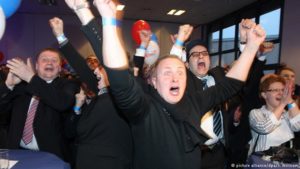by WorldTribune Staff, September 25, 2017
German Chancellor Angela Merkel may have won a fourth term in the Sept. 24 elections, but the anti-immigrant party AfD stole the spotlight.
Not only did the AfD enter the German parliament for the first time, it won enough seats to become the third-largest party in the Bundestag after Merkel’s conservative CDU and her nearest rivals, the social democratic SPD.

“The AFD, the nationalist far right party which has good relations with Russia will have for the first time parliamentary Presence with 13% of the vote,” said Fariborz Saremi, a Hamburg-based analyst and WorldTribune.com contributing editor.
“The AFD draws most of its support from citizens in the eastern part of the country, who feel disenfranchised. Beyond those states it has also capitalized on anxieties born from the refugee crisis , Islamization of Germany and the threat of Islamic terrorism,” he said.
Peter Matuschek, of pollsters Forsa, said the AfD deliberately attracted media attention by making provocative statements.
“They pursued an agenda of targeted provocation, as did President Trump,” he said. “Once a provocative statement was made, a politician could rely on being quoted in the media the day after.”
Alexander Gauland, one of the AfD’s leaders and newly-elected member of parliament, said the party is ready to “Take back the country and the people.”
“One million people – foreigners – being brought into this country are taking away a piece of this country and we as AfD don’t want that,” Gauland said.
The AfD is expected to take 94 seats in the 709 member Bundestag, making it the third largest party. It won 12.6 per cent of the vote.
Analysts in Berlin warned against allowing the AfD to dominate the discussion.
Saremi assured that Germany is not “swerving towards the extremes.”
“If anything this election has shown how solidly the country’s political center ground can hold. German stability is good news for Europe and the globe,” he said.
Matthias Jung of pollsters Forschungsgruppe Wahlen told reporters in Berlin that “of course we have to stand up against their views, but if the media all focus on the AfD, exclusively pushing them into the Nazi corner, then it creates a certain effect: everyone who sympathizes with the AfD in a more general way is also being pushed into that corner, and they feel treated in an unjust manner.”
“Among the voters who support the AfD, you don’t have a coherent radical right ideology: they are dissatisfied with things that happened, but not necessarily just the refugee crisis.”
It was the conservatives’ worst election result under Merkel’s leadership, a performance that analysts said was undoubtedly tied to her decision to open Germany’s doors to more than one million refugees.
Merkel’s CDU party achieved its worst result in 70 years, while its former coalition partners, the center-left SPD, also hit rock-bottom. The CDU won 33 percent, the SPD 20.5 percent, the liberal FDP 10.7, the left-wing Die Linke 9.2 and the Greens 8.9.
Subscribe to Geostrategy-Direct __________ Support Free Press Foundation
